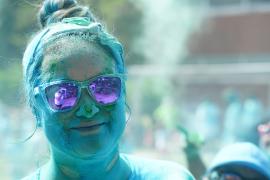Scientific studies suggest that 21st-century learning skills like creativity are fundamental contributors to how our brains develop. Brain development is stimulated by social and emotional experiences in educational environments that feel safe, inclusive, trusting, inspiring, and empowering. Positive relationships trigger brain chemistry to allow it to be more adaptable and enable one to learn more easily. Likewise, chronic and excessive stress and loneliness are toxic to brain development. However, the negative effects of stress can be buffered through supportive community, relationships, and exposure to green spaces (Immordino-Yang, Darling-Hammond, & Krone, 2018). Camp programs provide nature-based, essential, immersive summer learning experiences that activate our minds. Camps also strengthen a young person’s feeling of connectedness to others, being supported and sharing culture, values, and purpose.
Increasing feelings of loneliness across generations in the U.S. and abroad have garnered considerable media attention. Among the U.S. high school students who participated in the Center for Disease Control’s 2017 Youth Risk Behavior Survey, one-third reported feeling persistently sad or hopeless (National Center for HIV/AIDS, Viral Hepatitis, STD, and TB Prevention, Division of Adolescent and School Health, 2017). In conversations with camp professionals at a recent conference, I was disheartened to learn anecdotally that camp pros are sensing an increasing trend among their Gen Z summer staff toward chronic anxiety and feeling “disposable” in the face of technological advances and automation. With well-developed human skills such as relationship cultivation, communication, decision-making, creativity, and emotional intelligence, Gen-Zers can become well prepared for work in the coming human-skills-centered economy. I believe immersive camp experiences offer critical social and emotional education opportunities for Generation Z.
In our camp communities, we start by building strong camp staff cultures by emphasizing connectedness through physical and emotional safety, inclusion, cross-cultural agility, respectful and authentic relationships, teamwork, trust, servant leadership, and common purpose. On that foundation of staff community, we prioritize a camper and staff learning culture that gives special attention to caring relationships, high expectations, meaningful participation, autonomy, and purpose. Within that camp culture we do our best to meet the individual needs of every camper and staff member so they feel physically and emotionally safe, have a keen sense of belonging and empowerment, and have opportunities to be challenged and to work toward mastering challenges.
By developing these highly connected, healthy educational camp communities, we are promoting positive brain development through social and emotional education. I recently enjoyed a presentation by neuroscientist Richard Davidson, PhD, in which he explained how our brains are quite adaptable to experiential changes in our learning environment and how social and emotional learning is empirically proven to improve emotional regulation and social adaptation. Experiential education can literally shape a young person’s brain and effect changes that lay the foundation for future learning, emotional regulation, and social functioning (Davidson, 2008). At the core of this positive human development is outstanding leadership (you) and a healthy camp learning climate with a pervasive culture of belonging and connection.
I look forward to celebrating high-quality camp and connection with you at the upcoming ACA National Conference in San Diego, California, this February. Thank you for all you do for children, youth, and adults everywhere!
References
- Davidson, R. (2008, February 27). The heart-brain connection: The neuroscience of social, emotional and academic learning. Edutopia. Retrieved from edutopia.org/video/heart-brain-connection-neuroscience-social-emotional-and-academic-learning
- Immordino-Yang, M. H., Darling-Hammond, L., & Krone, C. (2018, September). The brain basis for integrated social, emotional and academic development. The Aspen Institute National Commission on Social, Emotional and Academic Development. Retrieved from assets.aspeninstitute.org/content/uploads/2018/09/Aspen_research_FINAL_web.pdf
- National Center for HIV/AIDS, Viral Hepatitis, STD, and TB Prevention, Division of Adolescent and School Health. (2017). Youth risk behavior survey 2017. Centers for Disease Control and Prevention. Retrieved from cdc.gov/healthyyouth/data/yrbs/pdf/trendsreport.pdf


